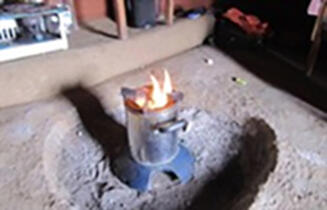
LSTM hosted the first meeting of the Cooking and Pneumonia Study (CAPS) Trial Steering Committee to discuss various aspects around this cluster randomised trial to investigate an advanced cookstove intervention to prevent pneumonia in children under 5 in Malawi. The study was recently awarded £2.7 million by the Joint Global Health Trials Scheme, a partnership of the UK Department for International Development (DfID), the Medical Research Council (MRC) and the Wellcome Trust.
Whereas various ongoing cookstove interventions try to target issues around ecological devastation and fuel security this intervention will try to assess, through a randomised trial set-up, the health benefits of clean cookstoves aimed to reduce the effects of domestic smoke inhalation. This is a problem in low and middle income countries around the world, where open fires, used for heating, cooking and lighting, are commonly used inside the main living quarters of homes.
Head of LSTM’s Clinical Sciences Department and Co-Prinicipal Investigator for CAPS Professor Stephen Gordon, said: “It is the poorest people in the world who use open fires in their homes, which are often basic structures with poor ventilation. The harmful effects of the smoke inhalation lie between passive and active cigarette smoking. Chronic obstructive pulmonary disease (COPD) is an example of one of these harmful effects."
It is estimated that just under half of the world’s population live in such conditions, with those affected being primarily women and children who spend the most time in the home. Excessive smoke inhalation can cause pneumonia, COPD and cardiovascular disease, accounting for more than two million deaths annually. The importance of this problem has been highlighted by the Global Alliance for Clean Cookstoves, which is backed by former US secretary of state Hillary Clinton.
The two year study will track 10,000 children aged under five who live in randomised villages in Malawi. The homes of the children involved in the study will be supplied with two clean cookstoves to see if the new stoves will stop the children getting pneumonia, a major cause of death in this age group.
Working alongside Professor Gordon, is Co-Principal Investigator Dr Kevin Mortimer, a Respiratory Consultant at Liverpool’s Aintree University Hospital and a Senior Clinical Lecturer at LSTM. Dr Mortimer said: “The cookstoves burn the same fuel used in the open fires but much more efficiently, which reduces the amount of smoke emitted by around ninety per cent. The implications could be enormous and benefit millions of people around the world.”
The importance of this health issue is reinforced by the make-up of the CAPS Trial Steering Committee. Professor Gordon and Dr Mortimer are joined on committee by clinical trials expert Professor David Lalloo, Dean of International Health and Clinical Sciences at LSTM and Director of the Wellcome Trust Tropical Centre in Liverpool (independent member); past president of the American Thoracic Society and Associate Director for Translational Biomedicine at the U.S. National Institute of Environmental Health Sciences, Professor Bill Martin (independent member); Norman Lufesi, Programme Manager from the Malawian Ministry of Health (independent member); Professor Shabbar Jaffar of the London School of Hygiene and Tropical Medicine (independent member) and David Crosby, Programme Manager for Cardiorespiratory Medicine and Inflamation, at the British Medical Research Council. The committee is chaired byAnne Tattersfield OBE, who also chaired this first two day meeting.